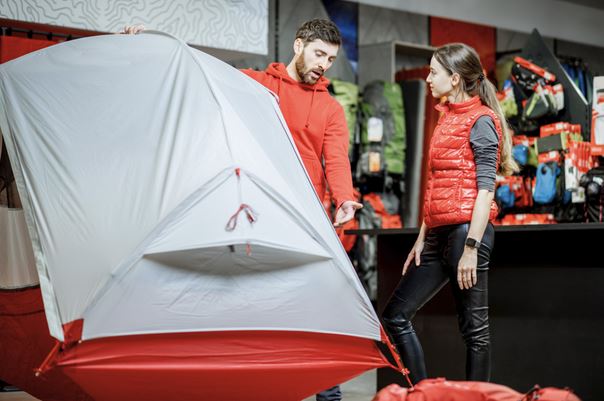This blog post may contain affiliate links. As an Amazon Associate I earn from qualifying purchases.
Camping is a fantastic way for me to connect with nature, unwind, and create lasting memories. But one of the first decisions any camper faces is whether to buy a tent or rent one for their outdoor adventures. In this blog, I’ll explore the costs and considerations of both options to help you make an informed choice.
The Cost of Buying a Tent
When it comes to purchasing a tent, several factors influence the cost. The type of tent, its size, brand, and included features all play a role. Tent prices span from budget-friendly options in the $50-100 range to high-end models that can cost several hundred dollars or more. While the upfront cost may seem steep, owning a tent can be a long-term investment that pays off if you’re a frequent camper.
The Cost of Renting a Tent
Renting a tent is an alternative for those who camp less frequently or don’t want to make a substantial initial investment. Rental costs vary based on the type of tent and the rental provider. On average, I can expect to pay around $25-50 per day for a basic two-person tent, but this cost can increase for larger and more specialized tents. Keep in mind that some rental services may charge additional fees for cleaning or require a deposit.
The Pros of Buying a Tent
- Long-term Savings
Investing in a tent can lead to significant long-term savings, especially for a frequent camper. While the initial purchase might seem like a notable expense, the cost per use decreases over time, making it a cost-effective choice for me. - Freedom
With my own portable shelter, I can embark on spontaneous camping trips and set up camp on my schedule. This flexibility enables me to explore different locations without the constraints of reservation schedules or the availability of rental equipment. - Familiarity
Having my own tent means I become intimately familiar with its setup and features, enhancing the efficiency of setting up and taking down my shelter and contributing to a more comfortable camping experience. - Quality Control
Owning a tent allows me to invest in a durable and reliable shelter, ensuring better protection against the elements and enhancing my overall camping enjoyment.
The Cons of Buying a Tent
- Initial Cost
The upfront cost can be a barrier for some campers, especially for high-quality tents with advanced features. - Storage Space
Tents can take up a considerable amount of storage space, which may be a challenge for campers with limited storage options at home. - Maintenance Responsibilities
Owning a tent involves maintenance responsibilities, such as cleaning, drying, and proper storage to prevent mold and mildew. - Variety Limitations
You are limited to the specific features and design of the tent you own, unlike renting, where you can experiment with different types of tents for various camping scenarios.
Transportation Considerations
Transporting a tent can be cumbersome, especially if you rely on public transportation or have limited space in your vehicle.
The Pros of Renting a Tent
- Cost-Effective for Occasional Campers
Renting is a cost-effective option, particularly for those who camp infrequently. - No Storage or Maintenance
After your camping trip, you can simply return the tent without having to worry about storage or maintenance responsibilities. - Variety
Renting provides the opportunity to experiment with different types of tents without committing to a purchase.
The Cons of Renting a Tent
- Limited Availability
Tents may not always be accessible for the dates or locations you desire, especially during peak camping seasons. - Potential Long-term Costs
Rental costs may add up over time for frequent campers, surpassing the upfront cost of purchasing a tent. - Dependency on Rental Policies
You are dependent on the rules and regulations of the rental service, which may not always align with your preferences and can limit potential spontaneous camping plans. - Quality Variability
The quality of rented tents can vary depending on the rental provider.
Factors to Consider When Choosing Between Renting Or Buying A Tent
So, should I buy or rent a tent? It depends on my unique circumstances. Consider the following factors:
- Camping Frequency
If you camp often, investing in a high-quality tent may be more economical. For occasional campers, renting can save money. - Budget
Your budget will play a significant role in my decision. - Storage Space
Do you have room to store a tent when it’s not in use. - Camping Goals
Think about your camping goals.
Final Thoughts – Should You Rent Or Buy A Tent
In the end, the decision to buy or rent a tent for camping boils down to your individual preferences and needs. Whether you’re a seasoned camper or a newbie looking to dip my toes into the world of outdoor adventures, I should carefully weigh the pros and cons of both options. Remember, the most important thing is to enjoy the great outdoors and create wonderful memories, regardless of whether you own or rent your camping shelter.
FAQs
What are the main factors to consider when deciding between buying and renting a tent?
Consider your camping frequency, budget, storage space, and camping goals. Frequent campers may benefit more from buying due to long-term cost savings, while occasional campers may find renting more cost-effective. Additionally, owning a tent means having your own shelter on demand, but renting allows you to experiment with various tent types without a commitment.
How much does it cost to rent a tent compared to buying one?
Tent rental costs typically range from $25 to $50 per day for a basic two-person tent, although this may increase for larger or more specialized tents. Purchasing a tent can range from around $50 for budget models to several hundred dollars for high-end options. For frequent campers, buying might be more economical over time, while renting is often more affordable for occasional trips.
What are the benefits of renting a tent instead of buying one?
Renting can be ideal for those who camp occasionally, as it avoids the need for storage and maintenance. Renting also allows campers to try out different types of tents, and it’s a cost-effective choice if you don’t want to invest in your own equipment. However, be mindful of rental availability, potential quality variability, and added fees from rental services.
What are the downsides of owning a tent?
Owning a tent requires an initial investment, which can be high for quality models. It also means you need adequate storage space, and maintenance for long-term durability, and you’re limited to the features of the specific tent you own. Additionally, transportation can be challenging, especially for larger tents or if you lack vehicle space.


